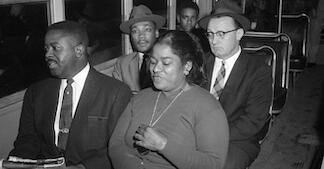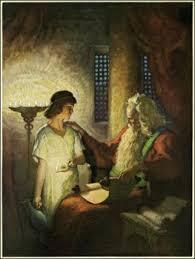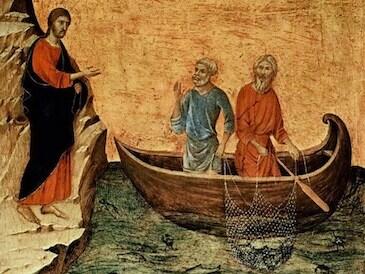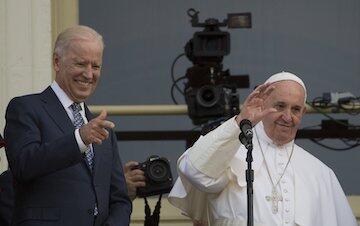 We mark this weekend the national holiday in honor of Dr. Martin Luther King, one of the most important Americans of the 20th century and, arguably, among the key figures in American history. He spoke out for racial justice and the equal dignity of all, and he — along with many sisters and brothers, because he was never all alone — put his life on the line again and again, and despite verbal and physical threats did not back down, even to April 4, 1968, when he was murdered. Such a life, a model that all of us, whatever ethnic background, can aspire to.
We mark this weekend the national holiday in honor of Dr. Martin Luther King, one of the most important Americans of the 20th century and, arguably, among the key figures in American history. He spoke out for racial justice and the equal dignity of all, and he — along with many sisters and brothers, because he was never all alone — put his life on the line again and again, and despite verbal and physical threats did not back down, even to April 4, 1968, when he was murdered. Such a life, a model that all of us, whatever ethnic background, can aspire to.
He was an ordained minister, he had a doctorate from Boston University's School of Theology, and in 1955 he took up the work of ministry at a church in Montgomery, Alabama. All of that is a lot, and he surely would have been a wonderful minister through a long life. But he changed, he made hard choices, and he became an unexpected leader for African Americans and, as we found (often too late), a leader for all.
But why did he, and not the many others, become the leader and exemplar who made such a difference? Was it his special calling, his grace? My impression is that Dr. King did not hear a voice in the night calling to him, had no visions of Jesus calling him, and, born and raised in a spiritually committed family, was not a great sinner who underwent a radical conversion experience. It may be just that he rose to the moment when much was expected of him, all of a sudden: the word of God sparked within him at the right moment.
I am not a King scholar, but perhaps the day it all came together was on December 5, 1955. That evening, at his church in Montgomery, the Holt Street Baptist Church, he was unexpectedly put in charge. He was called upon with short notice to speak to the thousands who had gathered to confirm the bus boycott arising from the brave resistance of Mrs. Rosa Parks, who refused to give up her seat on a city bus to a white person, and was arrested for this effrontery to her “betters.” You can find the story of what happened that day in many places, included here, so it suffices to give what I find to be the central moment in his hastily written speech:
“Mrs. Rosa Parks is a fine person. And since it had to happen I'm happy that it happened to a person like Mrs. Parks, for nobody can doubt the boundless outreach of her integrity. Nobody can doubt the height of her character, nobody can doubt the depth of her Christian commitment and devotion to the teachings of Jesus. And I'm happy since it had to happen, it happened to a person that nobody can call a disturbing factor in the community. Mrs. Parks is a fine Christian person, unassuming, and yet there is integrity and character there. And just because she refused to get up, she was arrested.
“And you know, my friends, there comes a time when people get tired of being trampled over by the iron feet of oppression. There comes a time, my friends, when people get tired of being plunged across the abyss of humiliation where they experience the bleakness of nagging despair. There comes a time when people get tired of being pushed out of the glittering sunlight of life's July, and left standing amid the piercing chill of an alpine November. There comes a time.
You can also listen to Dr. King remember the boycott and what it meant...
There comes a time: the moment came, and unexpectedly Dr. King was on the spot. He rose to the occasion, he found his voice, and his life was never the same again. That is, he found his true vocation – within his vocation to ministry, within his vocation to a life of learning and scholarship. He found himself, a clear and brave voice, before God and his people. He could not expect December 5, 1955 to become such a landmark day. But so it was.
Finding one’s mission in life and place before God is something of a mystery: if only it was easy to know exactly what God wants! But really, vocation is a mystery.
 The Bible is of course full of many vocation stories: God unexpectedly choosing Abram and Sarah, soon to be Abraham and Sarah, father and mother of faith; confronting Moses in the burning bush; choosing David to be king, the youngest of many sons, only when all his older brothers were ignored by the great judge and prophet Samuel. Or prophets like Isaiah and Jeremiah and Amos, suddenly called upon, given a mission they had not asked for (just read the beginning of the book of each of these prophets for their stark, abrupt stories of calling). Or Saul, knocked down on the road to Damascus, in an instant transformed him into Paul, from persecutor of the new Christian community to its most eloquent defender.
The Bible is of course full of many vocation stories: God unexpectedly choosing Abram and Sarah, soon to be Abraham and Sarah, father and mother of faith; confronting Moses in the burning bush; choosing David to be king, the youngest of many sons, only when all his older brothers were ignored by the great judge and prophet Samuel. Or prophets like Isaiah and Jeremiah and Amos, suddenly called upon, given a mission they had not asked for (just read the beginning of the book of each of these prophets for their stark, abrupt stories of calling). Or Saul, knocked down on the road to Damascus, in an instant transformed him into Paul, from persecutor of the new Christian community to its most eloquent defender.
Consider today’s readings too. It would be so easy, we cannot but think, if we were like young Samuel, called by an insistent voice of God, or the apostles in John 1. The mighty Samuel was just a boy, awakened in the night:
"One night Eli, whose eyes were becoming so weak that he could barely see, was lying down in his usual place. The lamp of God had not yet gone out, and Samuel was lying down in the house of the Lord, where the ark of God was. Then the Lord called Samuel.
Samuel answered, “Here I am.” And he ran to Eli and said, “Here I am; you called me.” But Eli said, “I did not call; go back and lie down.” So he went and lay down. Again the Lord called, “Samuel!” And Samuel got up and went to Eli and said, “Here I am; you called me.” “My son,” Eli said, “I did not call; go back and lie down.” You see, Samuel did not yet know the Lord: The word of the Lord had not yet been revealed to him.
A third time the Lord called, “Samuel!” And Samuel got up and went to Eli and said, “Here I am; you called me.” Then Eli realized that the Lord was calling the boy. So Eli told Samuel, “Go and lie down, and if he calls you, say, ‘Speak, Lord, for your servant is listening.’” So Samuel went and lay down in his place.
The Lord came and stood there, calling as at the other times, “Samuel! Samuel!” Then Samuel said, “Speak, for your servant is listening.”
The Lord was with Samuel as he grew up, and he let none of Samuel’s words fall to the ground. And all Israel from Dan to Beersheba recognized that Samuel was attested as a prophet of the Lord. (I Samuel 3.2-10, 19-20)
It seems really easy, in a way, to be awakened by God’s persistent call in the middle of the night; the grace was perhaps to be a light sleeper, so as to not sleep through the most important moment of your life. Yet it was not clear at the start, so Eli, soon to die for the sins of his sons (read I Samuel 4), helped the boy to realize that it was God calling his name. The boy finally got the point, and he was endowed with words of power, the Word of God entered into him.
 Or take today’s Gospel, John 1, part of which we heard a few weeks ago in Advent:
Or take today’s Gospel, John 1, part of which we heard a few weeks ago in Advent:
"The next day John was there again with two of his disciples. When he saw Jesus passing by, he said, “Look, the Lamb of God!” When the two disciples heard him say this, they followed Jesus.
Turning around, Jesus saw them following and asked, “What do you want?”
They said, “Rabbi,” “where are you staying?”
“Come and see.”
So they went and saw where he was staying, and they spent that day with him. It was about four in the afternoon. (John 1.35-39)
Come and see: this seems easy, to have Jesus right there to tell you in your own language to follow him. But really so easy? Maybe not. They didn't know who he was, and we never hear whether Jesus called other women and men there by the shore of the lake, who ignored him, or declined to leave their boats, or simply stayed loyal to John the Baptist. Why did these particular men, Andrew and his unnamed companion, and then (in the rest of the chapter) Peter and Philip and Nathanael, decide to follow Jesus, when presumably others did not? Perhaps for their whole lives they were getting ready, even if they didn’t know it, until the very moment when John pointed and Jesus invited, "Come and see" — and the spark was ignited.
Vocation: Even if we assume that our lives have a religious purpose — a vocation not as an occupation, but as a deep sense of what God wants of you and me — we may still be wondering how we are supposed to know. We probably are more like Dr. King, preparing with one vision of life in mind, only to find out that on one day at one moment, suddenly God enables us to rise to the occasion, and speak the truth that changes everything.
Most often, it seems that surprising vocations come about in unsurprising ways. Thomas Merton's Seven Storey Mountain is a classic tale of a person’s slowly finding God in the midst of the myriad events of an ordinary middle class life in New York in the 1930s, and from there, he became the most famous monk in the world. Or Dorothy Day, finding God on the beach on Staten Island, confronted by the reality of her pregnancy and the hard choices she about to make about faith and marriage — and all of that only a preparation for the moment when Peter Maurin, that very odd Frenchman, walked into her life and suddenly founded the Catholic Worker, her ultimate calling in life. Or Mother Teresa, living a virtuous religious life at a school in Calcutta, only to hear another call one day, to leave the convent behind, and go out and live the rest of her life among the poorest of the poor, now a mother to all Indians of all faiths. Or you, when you made a change in your life because God was asking you to.
 What began with Abram and Sarah and Samuel and Martin Luther King is continuing today. In our fragile 2021 we are struggling for safety and justice and decency. You and I may not think we are called, since because we haven’t seen a burning bush or heard a voice in the night or got knocked on the ground. But we are called, we will be called, since God needs ordinary people who end up doing extraordinary things. So let us ponder the mystery of vocation at this holiday in honor of Dr. King, and during this week of pandemic and unrest and the new beginning that is the Inauguration of Joe Biden as our president. This old man, whom history seemed to have passed by, may suddenly be shown to be a crucial servant of God in the crisis that is 2021.
What began with Abram and Sarah and Samuel and Martin Luther King is continuing today. In our fragile 2021 we are struggling for safety and justice and decency. You and I may not think we are called, since because we haven’t seen a burning bush or heard a voice in the night or got knocked on the ground. But we are called, we will be called, since God needs ordinary people who end up doing extraordinary things. So let us ponder the mystery of vocation at this holiday in honor of Dr. King, and during this week of pandemic and unrest and the new beginning that is the Inauguration of Joe Biden as our president. This old man, whom history seemed to have passed by, may suddenly be shown to be a crucial servant of God in the crisis that is 2021.

